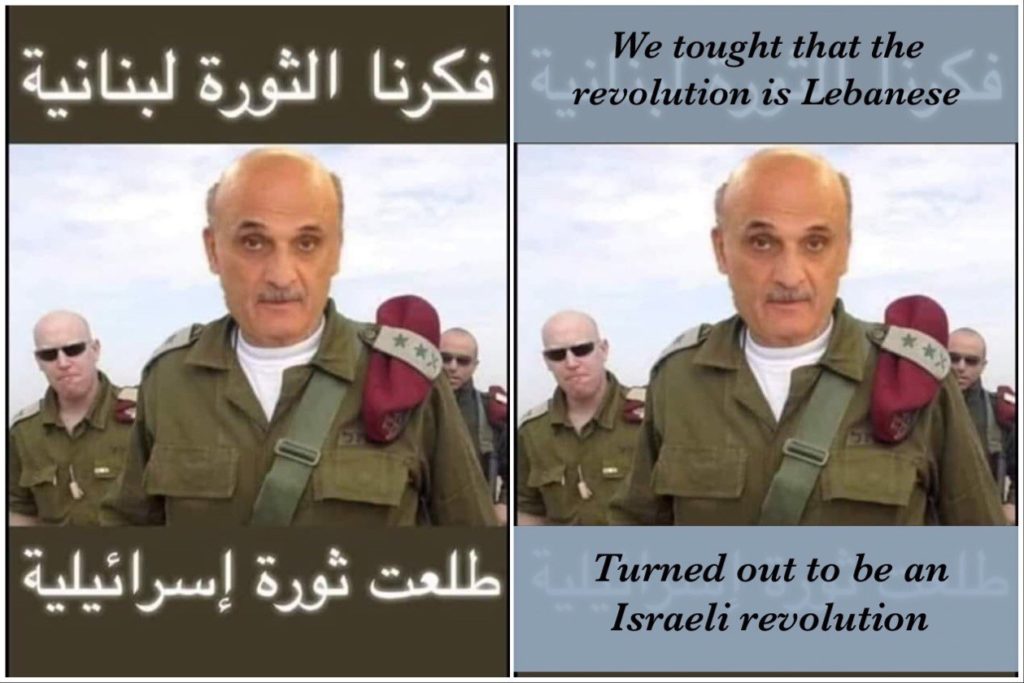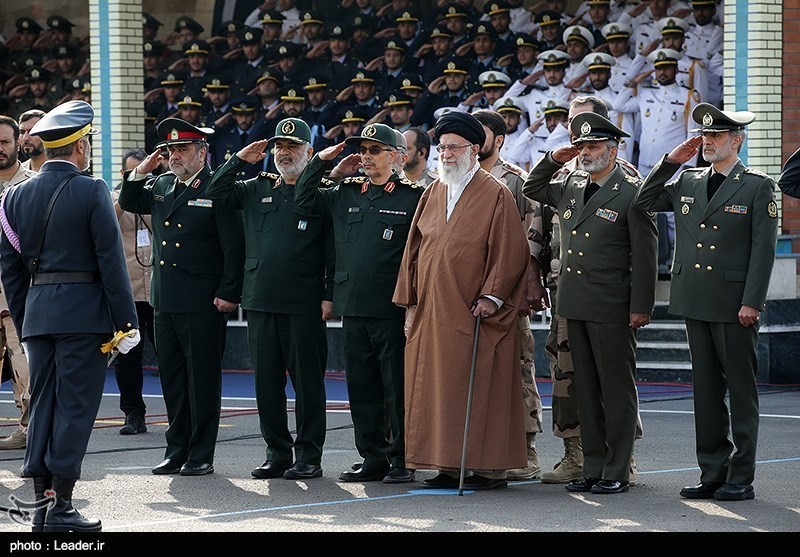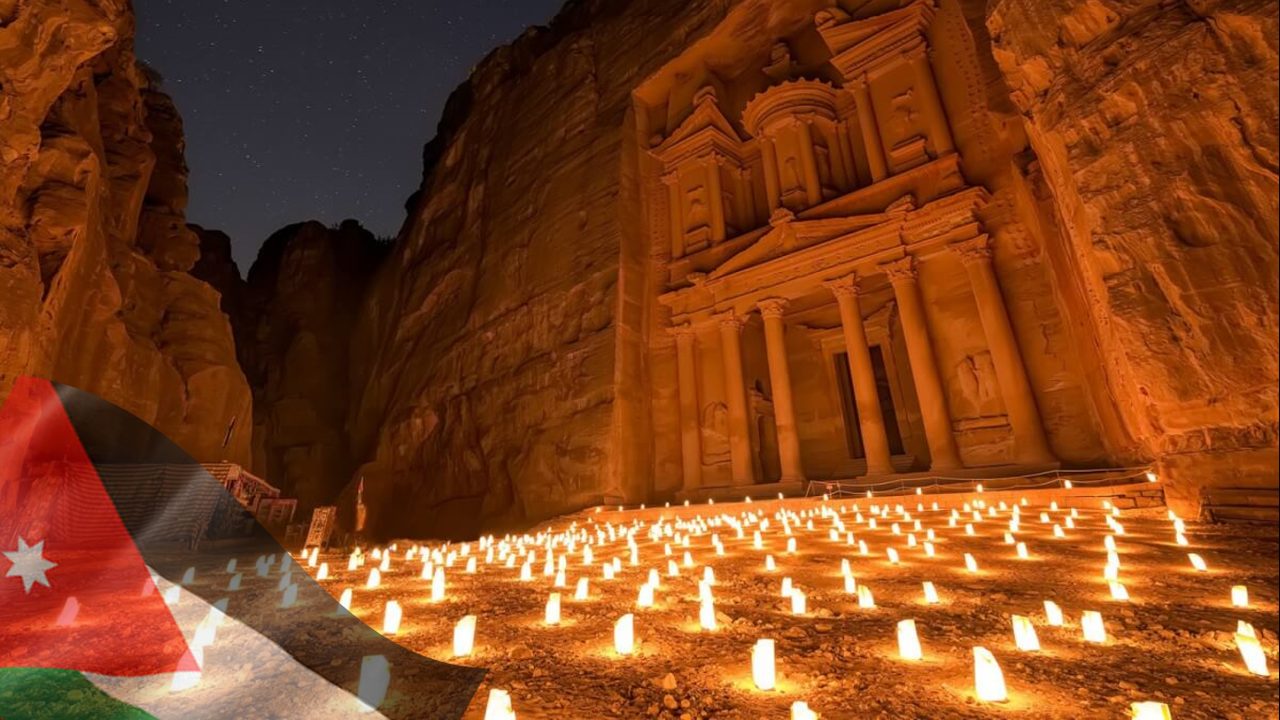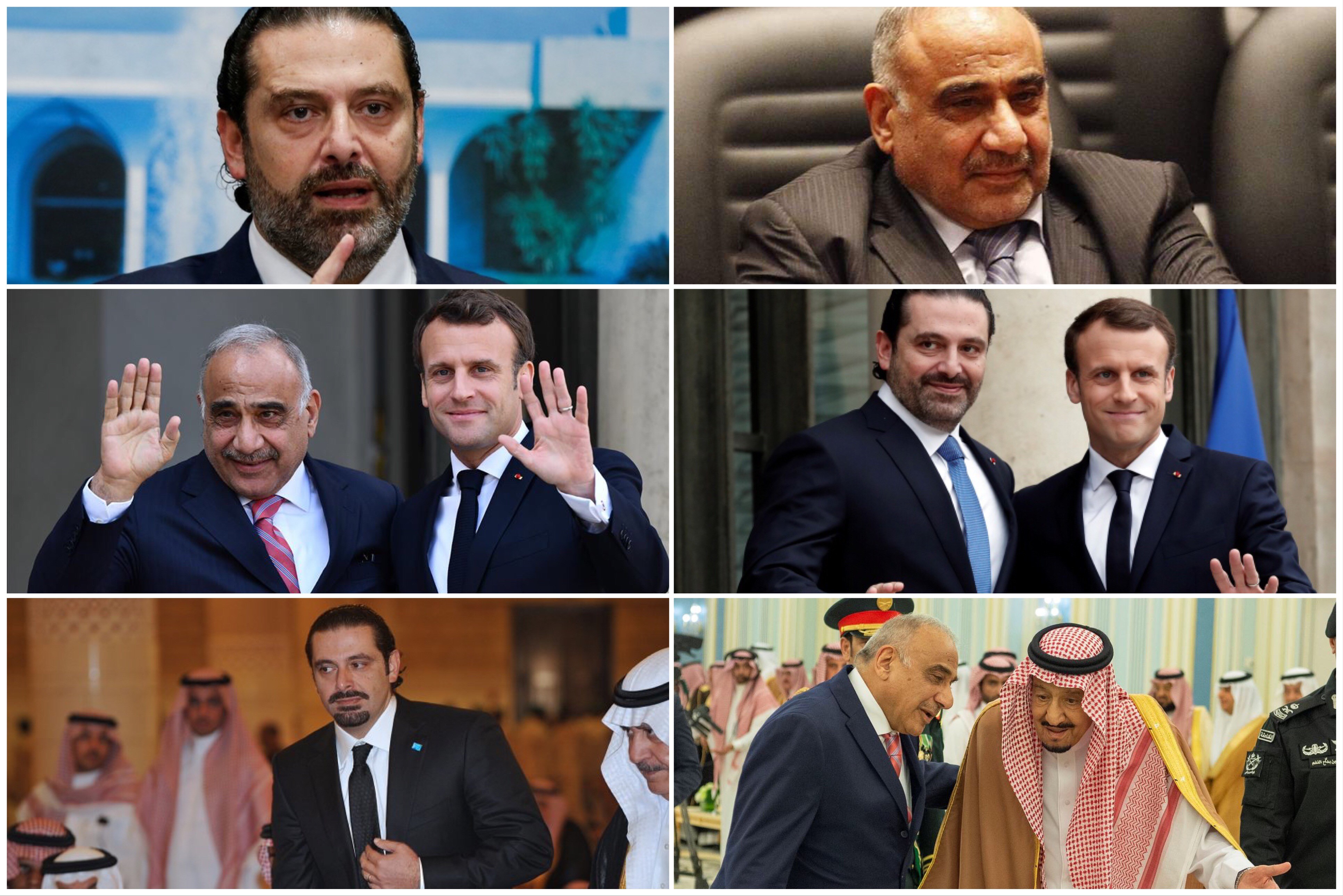Last week we saw how the events started to unravel in Lebanon. Long unseen protests shook the government, which hasn’t even lived a complete year. We indicated that there are strange similarities between the Lebanese and the Iraqi events. As if the same game is played on two fields. As we mostly dealt with the problem of Lebanon last week, this time we show the response and the Iraq scene.
The response
Ḥizb Allah on the other hand showed restrain as something unnatural was felt in the air. Ḥasan Naṣr Allah first talked to the nation on 19 October, reaffirming that all rumors about tax increase were only ideas and not accepted. Nor would they be accepted by the government. He strongly renounced to take his supporters to the streets in order to avoid clashes, but he also called the government to stay together. Because otherwise a huge amount of money and time would be wasted. Much rather, those who were responsible, should take the job seriously and act now. His words were in vain, as on 29 October, so only a day after the head of the Central Bank said the country is only days away from collapse, al-Ḥarīrī resigned. Which left no other alternative to the President than to issue scrap elections, while in the meantime another caretaker government would act.
How that would work is still questionable, but Ḥasan Naṣr Allah on 1 November already reacted to the news. He reassured everyone that his movement did not, and would not move to the streets, but also that what happened was irresponsible. In short, the Ḥizb Allah not let the ground be shaken under itself, as the Netanyahu was already celebrating it, and that it will take part in any future government to solve the problems.
It is also very telling that though throughout the protests the PM did not hold nor cabinet sessions, nor any serious negotiations with the main parties, only after his resignation started to reposition himself. On 6 November for the first time since the beginning of the crisis he held talks with Ğubrān Bāsīl, the head of the President’s party. Which indicates that even though al-Ḥarīrī was deeply responsible for the conditions of the country and that the government fell apart, and while he perfectly represents the corrupt elite against which the protests started, he still won’t retire. And in this light the whole chain of events should be thought through again.
Genuine protests?
It is a clear case that the first few days were the most beautiful and most genuine ones. All political commentators acknowledge that it begun spontaneously and the the hardship and the corruption is rightfully questioned. Strangely enough, however, the protestors early on attacked the offices of Ḥizb Allah and the Amal Party, while no such attempt were made on the PM’s Party. Nor on Salāma, who has much to do with the current crisis, since he is at the practical helm of the Lebanese economics for more than two decades. It is also very puzzling from where the slogans and demands came to disarm the resistance movement, which generally has a high esteem in the country, even if its close ties with Iran are questioned.
The whole set of events is strange. The fire was ignited by an internet tax idea, which is known to be a sensitive issue. Just for one instance, that is the same idea which for once managed to shake the ground under the Hungarian government in 2014, which’s grip on the country seems unquestionable since 2010. The protests against the Hungarian government that time were highly supported by the American Embassy, and the acting charge d’affaires took part in the protests. In Lebanon the idea of the net tax came from a minister of the PM’s party, yet the anger was not expressed against him. While Ğunblāṭ and Ğa‘ğa‘ quickly endorsed the movement and pulled out of the government. They had their supporters on the streets, while Ğunblāṭ’s Minister closed the schools, making sure that a huge number of young people be out. This was added by the fact that the banks were also closed. These, and his remarks about the imminent collapse of the Lebanese economy makes Salāma a part of all what happened. Al-Ḥarīrī practically did nothing for two weeks, only presented one weak package, and was wavering until he resigned. It all looks as the most corrupt segments of the government, who could have done much to prevent this meltdown, did their best to keep up the steam.
Even more curious that in the videos like the one below there are indications of foreign, mostly American support given to the protests. These helpers were educating the protestors, while also free kitchens were set up and gave massive technical support.
It is also curious why the Lebanese Army did nothing to suppress the aggression and banditry on the streets. There are, however, reports that there were American pressures on the Lebanese Army not to act and keep the protests going. And the American presence is all over this movement, which by now can be said, as many commentators put it, highjacked by outer forces. Not only by the huge media interest, and the intense false claims by the Israeli media over Ḥizb Allah’s alleged violations, but that the American Intelligence was practically orchestrating al-Ḥarīrī, Ğunblāṭ and Ğa‘ğa‘. The very fact that these three people with their more then controversial past took the moral high ground and they came out the best from the events should immediately cast doubts, as many caricatures came out of that.

But the most curious of all is that while the Lebanese people survived the civil war and years without government or president, now, only less than a year after finally having an elected government they would chose to topple it. It is not a coincidence that many commentators were lead to see as if the Syrian example is repeating itself now.
All these contradictions, however, are buried now under truly genuine frustration in a highly agitated population. In certain occasions it evolved in violence, while in other cases into festivities, but in any case it moves the country and polarizes the public opinion.
Iraqi mirror
We already addressed that the Iraqi government, which also is also a new one, only taking office a year ago, was under huge pressure. ‘Ādil ‘Abd al-Mahdī became a PM as a compromise between the winner parties, which were all but unhappy with the result. As some of them wanted to get closer to Tehran now, many wanted to distance Iraq politically, and the PM chose to find a careful middle road. We also covered that on 1 October massive protests started in Iraq, right when the country was constantly being attacked by mysterious, allegedly Israeli air strikes, and the importance of Iraq skyrocketed now for the US, as this is the only entry point to Eastern Syria, which was about to slip out of the American hands. This turmoil prevented the Iraqi government to block the US from restating itself in Syria, where it now builds two new military bases.
Here, just like Lebanon, the claims were corruption, usurpation of power and ineffectiveness, which almost instantly transformed to claims that Iraq became an Iranian province under this government. The similarities are huge, since though nothing is new in the general conditions, it is very strange why that government is about to be toppled, which has just been elected. On 11 the Iraqi PM sacked five ministers, though on 7 he was told Pompeo that the situation is under control. Apparently that is not the case, as the protests are still ongoing, and on 25 October the PM held a press conference in vain to offer reforms. It was held that he would not step down, for reasons still unclear on 31 October he “agreed to resign” under the sole condition that his substitute would be found first. On that occasion the very same day Iraqi President Barham Ṣāliḥ, who was also reported to be under pressure to be replaced, addressed the nation. He called for peace, while also accepting early elections and the redrafting of the election law.
Once again, a county in turmoil and in appalling conditions for decades, is being shaken by massive protests and the results of the last elections nulled, though for a long time it was relatively fair and genuine. In this regard this is not only a string resemblance to the Lebanese events, but also with what happened in Iraq 2014, when after ten years of absolute scandals relatively fair elections were held. But the result, which was highly disliked in the West, were crossed over suddenly by huge pressure. At that time it was the Dā‘iš.
Similarities, however, don’t stop here. On 26 October the Lebanese al-Ahbār reported about an inner security memo from the American Embassy in Baghdad, which details how the protests are being set up, run, orchestrated, technically supported and advertised by specialized divisions. Looking the video from the Lebanon that is the same image. Precisely the same. And that is hardly a coincidence.
The Iraqi events are full extreme details, which all suggest some level of foul play. And here we are not only talking about relatively minor details, like that an Emirati cell connected to the highest circles was apprehended in Iraq, which was agitating the protests. Nor that on 3 November the Iranian Consulate in Karbalā’ was attacked, which on its own astonishing, given that the city in one of the holiest in the Shia Islam. If there is a place in Iraq with firm support for the Islamic Republic it is there. But attacking the Iranian Consulate here is a huge humiliation. And we still don’t know who were the unidentified sharpshooters, who shot protestors and security personnel as well in the early days, and after almost a month the government is still silent on the matter. Though on 17 November Reuters quoted two unnamed Iraqi officials that the sharpshooters were liked to Iran. This, however, was sharply contrasted by the spokesman of the Supreme Leader of the Iraqi Armed Forces, Major-General ‘Abd al-Karīm Halaf, who in an interview given on 7 November on this subject, renounced the presence of Iranians. Therefore cannot be such an official opinion by the Iraqi forces.
But on 3 November Shaykh Qays al-Hazz-‘Alī, whose movement is part of the government, gave a long interview to a major Iraqi tv channel. Though he accepted the protestors anger and talked about a lot of thus far unknown events, there were two very significant details in the interview. One is that the shaykh openly accused the highest political circles being involved in the agitation for protests. Also, he claimed that after the first wave of protests the army leadership and the federal police claimed they are incapable of securing the protests and asked the al-Ḥašd aš-Ša‘abī, which is known to be close to Iran, at least in the leadership, to get involved in stopping the protests. Al-Hazz-‘Alī claimed that this was denied on the grounds that the al-Ḥašd aš-Ša‘abī does only fight terrorists and it is not their prerogative to deal with political rallies, it was clearly felt that some military leaders tried to push the blame on the Mobilization and wanted to cause uproar against it. That might sound like a conspiracy, but in July there were already suspicions that the US is working on a military coup, and shortly after military and intelligence officers were removed for this scandal.
It would seem that with the fall of this government a stabile player fell out from the Axis of Resistance, but as we suggested before, the fall of ‘Abd al-Mahdī just as much due to his political enemies in Iraq. Since we still don’t know who would take office, and upon what support, so is still early to judge. It is hardly a coincidence, and surely not genuine that the previous PM is became one of the loudest critic, and in the international press, while Iraq was not in any better state under his administration. However, that is sure that whoever in the West wanted a more friendly government had hardly any choice left, and now the time is extremely important, because as long as Iraq is busy, it cannot prevent the American return the Syrian oil fields.
Much more at stake.
If we accept the hypothesis that the suffering of the people, both in Iraq and Lebanon are being exploited and their protests highjacked, than what can be the reason? Not surprising to see that in Tehran as well, the leadership pulled a straight line between what happened in Iraq and Lebanon.

The events in Karbalā’ clearly support this deduction. On 30 October ‘Alī Hāmeneī warned of Zionist-American plots in both countries. It is fair to assume that after the failed attempt to counter the Axis of Resistance directly, the same uprising methods are being used now, as were in so many instances since the so called Arab Spring. These, however, should not be understood as strictly Iranian opinions at all. The same deliberations about a Western attempt against the Axis of Resistance and a new Arab Spring are all over the Arab press as well, from the more moderate ones to the most scandalous debates.
That game is a huge one for Iran now as well. If these attempts succeed and not turned back than any second might come to them. In Lebanon their position is more solid as the Ḥizb Allah might be squeezed out of the government, but has a massive following and it is unlikely to be crushed. The Iraqi scene is a much bigger gamble, as a more pro-Iran government is likely to come now, but it is much easier to drag the country into civil war. And the new wave of protests in Baghdad is clearly against Iran, which makes a formation of a new government a very dangerous gamble now for Tehran.
The sad truth is, however, that once again the hypocrisy is shown. Both on the ground and internationally. The most exploited people are being used for political agendas, and being used as cover, whenever these games are exposed. While the very elite, which caused their suffer, and the West which use this elite shred tears, their real concerns are less interesting.


